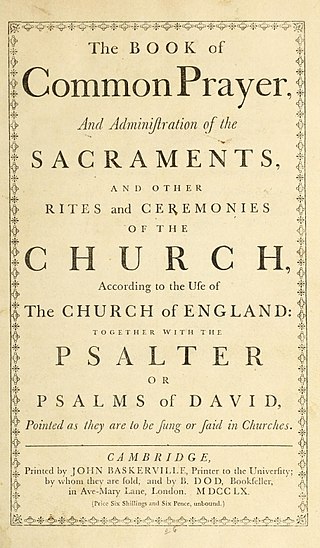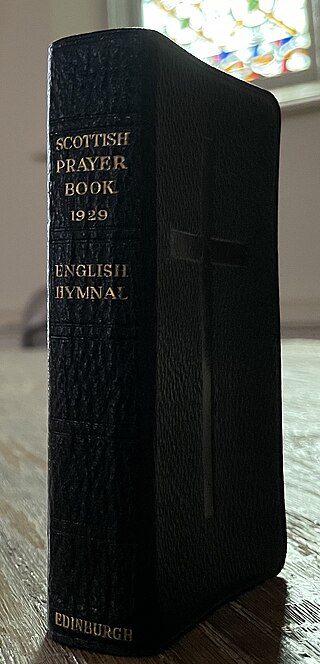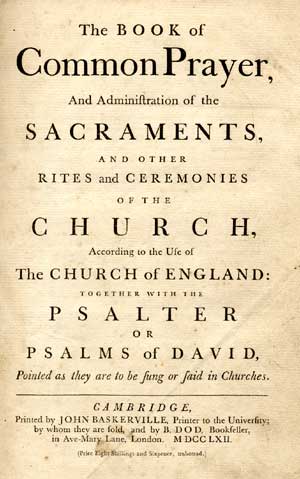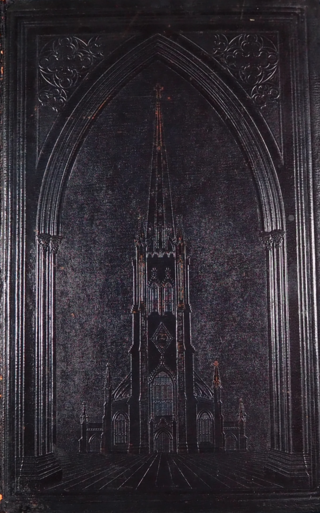See also
- Common Prayer (band)
- Custodian of the Standard Book of Common Prayer, an office with canonical responsibilities in churches of North American Anglicanism
Book of Common Prayer is the name given to a number of related prayer books used in the Anglican Communion.
Book of Common Prayer may also refer to:

The Book of Common Prayer (BCP) is the name given to a number of related prayer books used in the Anglican Communion and by other Christian churches historically related to Anglicanism. The first prayer book, published in 1549 in the reign of King Edward VI of England, was a product of the English Reformation following the break with Rome. The work of 1549 was the first prayer book to include the complete forms of service for daily and Sunday worship in English. It contained Morning Prayer, Evening Prayer, the Litany, and Holy Communion and also the occasional services in full: the orders for Baptism, Confirmation, Marriage, "prayers to be said with the sick", and a funeral service. It also set out in full the "propers" : the introits, collects, and epistle and gospel readings for the Sunday service of Holy Communion. Old Testament and New Testament readings for daily prayer were specified in tabular format as were the Psalms and canticles, mostly biblical, that were provided to be said or sung between the readings.

A missal is a liturgical book containing instructions and texts necessary for the celebration of Mass throughout the liturgical year. Versions differ across liturgical tradition, period, and purpose, with some missals intended to enable a priest to celebrate Mass publicly and others for private and lay use. The texts of the most common Eucharistic liturgy in the world, the Catholic Church's Mass of Paul VI of the Roman Rite, are contained in the 1970 edition of the Roman Missal. Missals have also been published for earlier forms of the Roman Rite and other Latin liturgical rites. Other liturgical books typically contain the Eucharistic liturgies of other ritual traditions, but missals exist for the Byzantine Rites, Eastern Orthodox Western Rites, and Anglican liturgies.
Christian liturgy is a pattern for worship used by a Christian congregation or denomination on a regular basis. The term liturgy comes from Greek and means "public work". Within Christianity, liturgies descending from the same region, denomination, or culture are described as ritual families.

The Anglican Missal is a liturgical book used liturgically by some Anglo-Catholics and other High Church Anglicans as an alternative or supplement to editions of the Book of Common Prayer. The Anglican Missal is distinct from the similarly Anglo-Catholic English Missal, as the Anglican Missal is not primarily a translation of the Roman Missal of the Roman Catholic Church.

Anglican eucharistic theology is diverse in practice, reflecting the comprehensiveness of Anglicanism. Its sources include prayer book rubrics, writings on sacramental theology by Anglican divines, and the regulations and orientations of ecclesiastical provinces. The principal source material is the Book of Common Prayer, specifically its eucharistic prayers and Article XXVIII of the Thirty-Nine Articles. Article XXVIII comprises the foundational Anglican doctrinal statement about the Eucharist, although its interpretation varies among churches of the Anglican Communion and in different traditions of churchmanship such as Anglo-Catholicism and Evangelical Anglicanism.
The Prayer of Humble Access is the name traditionally given to a prayer originally from early Anglican Books of Common Prayer and contained in many Anglican, Methodist, Presbyterian, and other Christian eucharistic liturgies, including use by the personal ordinariates for former Anglican groups reconciled to the Catholic Church. Its origins lie in the healing the centurion's servant as recounted in two of the Gospels. It is comparable to the "Domine, non sum dignus" used in the Catholic Mass.
The English Missal is a translation of the Roman Missal used by some Anglo-Catholic parish churches. After its publication by W. Knott & Son Limited in 1912, The English Missal was rapidly endorsed by the growing Ritualist movement of Anglo-Catholic clergy, who viewed the liturgies of the Book of Common Prayer as insufficient expressions of fully Catholic worship. The translation of the Roman Missal from Latin into the stylized Elizabethan Early Modern English of the Book of Common Prayer allowed clergy to preserve the use of the vernacular language while adopting the Roman Catholic texts and liturgical rubrics.

The 1928 Book of Common Prayer, sometimes known as the Deposited Book, is a liturgical book which was proposed as a revised version of the Church of England's 1662 Book of Common Prayer. Opposing what they saw as an Anglo-Catholic revision that would align the Church of England with the Catholic Church—particularly through expanding the practice of the reserved sacrament—Protestant evangelicals and nonconformists in Parliament put up significant resistance, driving what became known as the Prayer Book Crisis.
The Daily Office in Anglican churches focuses the traditional canonical hours on daily services of Morning Prayer and Evening Prayer, usually following the Book of Common Prayer. As in other Christian traditions, either clergy or laity can lead the daily office. Most Anglican clergy are required to pray Morning and Evening Prayer daily.

The 1979 Book of Common Prayer is the official primary liturgical book of the U.S.-based Episcopal Church. An edition in the same tradition as other versions of the Book of Common Prayer used by the churches within the Anglican Communion and Anglicanism generally, it contains both the forms of the Eucharistic liturgy and the Daily Office, as well as additional public liturgies and personal devotions. It is the fourth major revision of the Book of Common Prayer adopted by the Episcopal Church, and succeeded the 1928 edition. The 1979 Book of Common Prayer has been translated into multiple languages and is considered a representative production of the 20th-century Liturgical Movement.

The Divine Worship: Daily Office is the series of approved liturgical books of the Anglican Use Divine Offices for the personal ordinariates in the Catholic Church. Derived from multiple Anglican and Catholic sources, the Divine Worship: Daily Office replaces prior Anglican Use versions of the Liturgy of the Hours and the Anglican daily office. Alongside other Anglican Use books officially known as "Divine Worship", including the Divine Worship: The Missal, Divine Worship: Daily Office is considered a liturgical use of the Roman Rite.

The 1929 Scottish Prayer Book is an official liturgical book of the Scotland-based Scottish Episcopal Church. The 1929 edition follows from the same tradition of other versions of the Book of Common Prayer used by the churches within the Anglican Communion and Anglicanism generally, with the unique liturgical tradition of Scottish Anglicanism. It contains both the forms of the Eucharistic liturgy and Daily Office, as well as additional public liturgies and personal devotions. The second major revision of the Book of Common Prayer following the full independence of the Scottish Episcopal Church, the 1929 Scottish Prayer Book succeeded the 1912 edition and was intended to serve alongside the Church of England's 1662 prayer book.

The 1962 Book of Common Prayer is an authorized liturgical book of the Canada-based Anglican Church of Canada. The 1962 prayer book is often also considered the 1959 prayer book, in reference to the year the revision was first approved for an "indefinite period" of use beginning in 1960. The 1962 edition follows from the same tradition of other versions of the Book of Common Prayer used by the churches within the Anglican Communion and Anglicanism generally. It contains both the Eucharistic liturgy and Daily Office, as well as additional public liturgies and personal devotions. The second major revision of the Book of Common Prayer of the Anglican Church of Canada, the 1962 Book of Common Prayer succeeded the 1918 edition, which itself had replaced the Church of England's 1662 prayer book. While supplanted by the 1985 Book of Alternative Services as the Anglican Church of Canada's primary Sunday service book, the 1962 prayer book continues to see usage.

The 1662 Book of Common Prayer is an authorised liturgical book of the Church of England and other Anglican bodies around the world. In continuous print and regular use for over 360 years, the 1662 prayer book is the basis for numerous other editions of the Book of Common Prayer and other liturgical texts. Noted for both its devotional and literary quality, the 1662 prayer book has influenced the English language, with its use alongside the King James Version of the Bible contributing to an increase in literacy from the 16th to the 20th century.

The 1843 illustrated Book of Common Prayer is an illustrated version of the 1790 edition Book of Common Prayer, the then-official primary liturgical book of the American Episcopal Church, edited by Rev. J. M. Wainwright, printed and published by H. W. Hewet, a New York-based engraver and publisher, and certified by Bishop Benjamin T. Onderdonk on December 18th, 1843.

The 1984 Book of Common Prayer is a revised and authorised version of the Book of Common Prayer specifically for the use of the Church in Wales.
Anglican liturgy usually refers to liturgies according the Book of Common Prayer and its derivatives. It may also refer to the following liturgies and liturgical books used by churches and groups in the Anglican Christian tradition:
An ordinal, in a modern context, is a liturgical book that contains the rites and prayers for the ordination and consecration to the Holy Orders of deacons, priests, and bishops in multiple Christian denominations, especially the Edwardine Ordinals within Anglicanism. The term "ordinal" has been applied to the prayers and ceremonies for ordinations in the Catholic Church, where the pontificals of the Latin liturgical rites typically compile them along with other liturgies exclusive to bishops. In medieval liturgies, ordinals supplied instruction on how to use the various books necessary to celebrate a liturgy and added rubrical direction.

Since the 18th century, there have been several editions of the Book of Common Prayer produced and revised for use by Unitarians. Several versions descend from an unpublished manuscript of alterations to the Church of England's 1662 Book of Common Prayer originally produced by English philosopher and clergyman Samuel Clarke in 1724, with descendant liturgical books remaining in use today.
The 1928 Book of Common Prayer was the official primary liturgical book of the U.S.-based Episcopal Church from 1928 to 1979. An edition in the same tradition as other versions of the Book of Common Prayer used by the churches within the Anglican Communion and Anglicanism generally, it contains both the forms of the Eucharistic liturgy and the Daily Office, as well as additional public liturgies and personal devotions. It was the third major revision of the Book of Common Prayer adopted by the Episcopal Church, succeeding the 1892 edition and being replaced by the 1979 Book of Common Prayer.